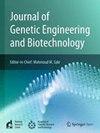cfDNA Key genomic markers in HCV-Induced hepatocellular carcinoma in Egyptian patients
IF 2.8
Q3 Biochemistry, Genetics and Molecular Biology
Journal of Genetic Engineering and Biotechnology
Pub Date : 2025-07-17
DOI:10.1016/j.jgeb.2025.100533
引用次数: 0
Abstract
Background
Malignant liver disease is among the highest in the world, with hepatocellular carcinoma (HCC) accounting for up to 90 % of all cases. In Egypt, HCC poses a significant public-health concern, representing 47.17 % of cancer cases. The high incidence of hepatitis C virus (HCV) in the Egypt was a major predisposing factor for HCC.
Material
This study included 63 Egyptian HCC patients, 55 % of whom had a history of HCV infection.
Methods
Using a paired sampling strategy, approximately 2800 COSMIC mutations from 50 oncogenes and tumor-suppressor genes were NGS sequenced.
Results
Total of 381 somatic mutations were identified, 91 mutations detected in the HCC group and 291 in the HCV-related HCC group. The top 10 mutated genes in the non-HCV group were TP53, ATM, EGFR, CDH1, FGFR1, MET, SMAD4, ERBB2, FLT3, and FBXW7, while in the HCV-related HCC group, genes were KIT, ATM, TP53, APC, FBXW7, KDR, RB1, SMAD4, EGFR, and PIK3CA.
Conclusion
The present study represents the first comprehensive somatic mutation profile in HCC Egyptian patients. This finding suggests that HCV viral infection played a direct and indirect role in increasing the somatic mutation burden in HCV-related HCC patients and opens new promises of targeted therapies for those patients.
cfDNA在埃及hcv诱导的肝细胞癌患者中的关键基因组标记
恶性肝病是世界上发病率最高的疾病之一,肝细胞癌(HCC)占所有病例的90%。在埃及,HCC是一个重大的公共卫生问题,占癌症病例的47.17%。在埃及,丙型肝炎病毒(HCV)的高发病率是HCC的主要诱发因素。本研究纳入63例埃及HCC患者,其中55%有HCV感染史。方法采用配对采样策略,对来自50个癌基因和肿瘤抑制基因的约2800个COSMIC突变进行NGS测序。结果共检测到381个体细胞突变,HCC组检测到91个突变,hcv相关HCC组检测到291个突变。非hcv组前10位突变基因为TP53、ATM、EGFR、CDH1、FGFR1、MET、SMAD4、ERBB2、FLT3和FBXW7, hcv相关HCC组前10位突变基因为KIT、ATM、TP53、APC、FBXW7、KDR、RB1、SMAD4、EGFR和PIK3CA。结论本研究首次对埃及HCC患者进行了全面的体细胞突变分析。这一发现表明,HCV病毒感染在增加HCV相关HCC患者的体细胞突变负担中起着直接和间接的作用,并为这些患者的靶向治疗开辟了新的希望。
本文章由计算机程序翻译,如有差异,请以英文原文为准。
求助全文
约1分钟内获得全文
求助全文
来源期刊

Journal of Genetic Engineering and Biotechnology
Biochemistry, Genetics and Molecular Biology-Biotechnology
CiteScore
5.70
自引率
5.70%
发文量
159
审稿时长
16 weeks
期刊介绍:
Journal of genetic engineering and biotechnology is devoted to rapid publication of full-length research papers that leads to significant contribution in advancing knowledge in genetic engineering and biotechnology and provide novel perspectives in this research area. JGEB includes all major themes related to genetic engineering and recombinant DNA. The area of interest of JGEB includes but not restricted to: •Plant genetics •Animal genetics •Bacterial enzymes •Agricultural Biotechnology, •Biochemistry, •Biophysics, •Bioinformatics, •Environmental Biotechnology, •Industrial Biotechnology, •Microbial biotechnology, •Medical Biotechnology, •Bioenergy, Biosafety, •Biosecurity, •Bioethics, •GMOS, •Genomic, •Proteomic JGEB accepts
 求助内容:
求助内容: 应助结果提醒方式:
应助结果提醒方式:


